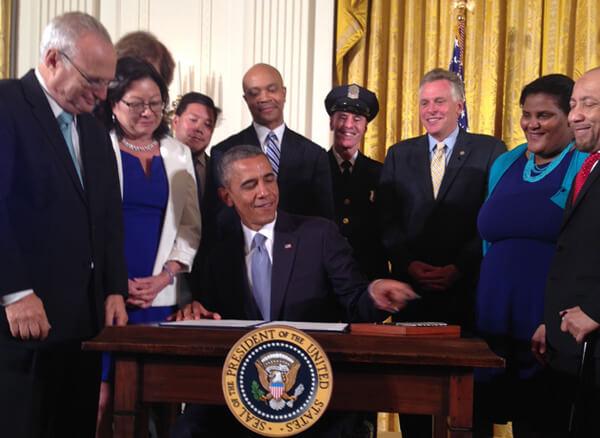A federal court has ruled that Wisconsin’s refusal to cover the costs of “surgery and sex hormones associated with gender reassignment” for its transgender state employees violates the ban on sex discrimination in Title VII of the 1964 Civil Rights Act and in the Affordable Care Act, as well as the 14th Amendment’s Equal Protection Clause.
District Judge William M. Conley had previously awarded a preliminary injunction to transgender Medicaid participants who were seeking similar coverage under that program, having concluded they were likely to prevail on the merits of their claims.
In this new decision on September 18, in a case brought by Alina Boyden and Shannon Andrews, both employees of the University of Wisconsin, Conley granted their motion for summary judgment, so this is a final ruling on liability. There could still be a trial on damages if the state doesn’t settle.
Coverage for gender transition hormones and surgery have been excluded from the uniform benefits offered Wisconsin public employees since 1994, when the state concluded that insurance companies generally view them as “experimental and not medically necessary.”
In this case, however, the state argued this exclusion is not total, since hormone treatment for gender dysphoria is covered “unless specifically made a course of treatment leading to or involving gender conforming surgery.” The two sides in the lawsuit, however, disagreed about how this is interpreted and applied in practice.
“There is no dispute that mental health counseling as a stand-alone treatment for gender dysphoria is covered, whereas hormone therapy involving gender reassignment surgery is not covered; and there is no dispute that the surgery itself is not covered,” Conley wrote. Also excluded from coverage are “treatment, services, and supplies for cosmetic purposes,” with the state explaining that “psychological reasons do not represent a medical/ surgical necessity.”
During the Obama administration, the Department of Health and Human Services took the position that the Affordable Care Act’s ban on sex discrimination in insurance benefits would include gender identity discrimination, and it looked like Wisconsin might change its position in January 2017 to coincide with a new coverage requirement from HHS. Meanwhile, however, Wisconsin had joined a lawsuit in the federal district court for the Northern District of Texas — a judicial venue of choice for social conservatives — asserting that interpreting the ACA to cover gender identity discrimination was “unlawful.” That court issued a nationwide injunction on December 31, 2017, blocking HHS from enforcing its gender identity discrimination policy. By then, Wisconsin’s Republican administration had already pulled back from its original plan to rescind the 1994 exclusion.
For Judge Conley, however, this political by-play was essentially irrelevant to his ruling. In reviewing the reasons articulated by members of the board overseeing public employee health coverage, he essentially embraced one member’s testimony that he supported ending the 1994 policy because he “viewed the exclusion as discriminatory and supports the right of transgender individuals to get the healthcare they need” and that “it’s not costly to add it to the group plan.”
Wisconsin is within the Chicago-based Seventh Circuit Court of Appeals’ jurisdiction, whose rulings are binding on Conley. In making his ruling, Conley noted the Seventh Circuit’s championing of LGBTQ rights in two 2017 decisions. In Hively, the appeals court held that discrimination based on sexual orientation is prohibited by Title VII’s ban on sex discrimination in employment. In Whitaker, the court ruled that discrimination based on gender identity is prohibited by Title IX’s ban on sex discrimination in public schools. Putting them together, Conley found it easy to conclude that gender identity discrimination violates Title VII as well, despite a 1984 Seventh Circuit decision ruling out such claims — one that the circuit has never explicitly overruled.
The 1994 exclusion, Conley wrote, “implicates sex stereotyping by limiting the availability of medical transitioning, if not rendering it economically infeasible, thus requiring transgender individuals to maintain the physical characteristics of their natal sex. In other words, the Exclusion entrenches the belief that transgender individuals must preserve the genitalia and other physical attributes of their natal sex over not just personal preference, but specific medical and psychological recommendations to the contrary.”
The State of Wisconsin’s “assertion that the Exclusion does not restrict transgender individuals from living their gender identity is entirely disingenuous, at least for some portion of that population who will suffer from profound and debilitating gender dysphoria without the necessary medical transition,” Conley added.
Because Conley found that the exclusion is a form of sex discrimination, the 1994 policy is subject to “heightened judicial scrutiny” under the Equal Protection Clause, throwing the burden on the government to show that it substantially advances important state interests. Here, too, the state fell short. The record shows no evidence that the oversight board voted to back away from eliminating the 1994 exclusion out of cost or efficacy reasons, which is what the state asserted, Conley found.
Plaintiffs Boyden and Andrews are represented by John Anthony Knight of the ACLU Foundation in Chicago, Laurence J. Dupuis of the ACLU of Wisconsin Foundation in Milwaukee, and local counsel Michael Godbe and Nicholas E. Fairweather of Hawks Quindel in Madison.




































